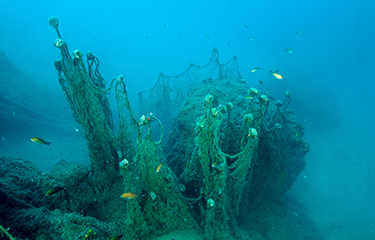Second UN session negotiating global plastic pollution treaty emphasizes ghost gear

The second of five planned meetings hosted by the Intergovernmental Negotiating Committee (INC) of the United Nations Environment Program (UNEP) to discuss global plastic pollution ended with greater emphasis and discussion on marine debris, including abandoned, lost, or discarded fishing gear (ALDFG) – also known as ghost gear.
The INC sessions aim to negotiate an international, legally binding plastics treaty, as global plastics pollution – including ALDFG throughout the world’s oceans and microplastics now found in such remote places as Mount Everest – has continued to proliferate mostly unabated on an international level.
The first INC session (INC-1), which took place in late November 2022 in Uruguay, covered the objective, scope, and structure of the agreement.
Notably, marine debris and ghost gear were largely absent from the discussion, causing concerns from nonprofits such as Ocean Conservancy, which pressed member nations to address these issues in the second session (INC-2) ahead of a zero draft – the first written version of the agreement up for negotiation that outlines the treaty’s background followed by principles and proposed provisions.
“This is a once-in-a-generation opportunity to try to address plastic pollution in a holistic way,” Ocean Conservancy Global Ghost Gear Initiative (GGGI) Associate Director Joel Baziuk said. “We’re starting to see momentum from a lot of different countries wanting to include sea-based sources of marine debris [in the agreement] like ALDFG or ghost gear, for example, but also things like microplastics and how these are present in the ocean.”
Due to the lack of emphasis on marine debris in INC-1, Ocean Conservancy published a paper ahead of INC-2 with a series of specific recommendations …
Photo courtesy of zaferkizilkaya/Shutterstock





Share